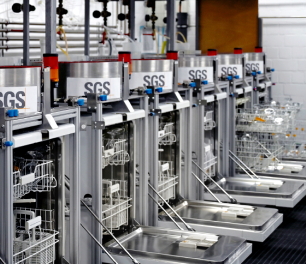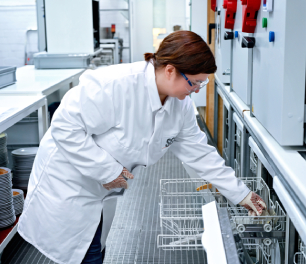Dishwasher Resistance Test Service
EN 12875 specifies a method for testing the resistance of domestic articles made from ceramic, glass, glass ceramic, vitreous enamel, metal, and plastics under the combined chemical, thermal, and mechanical stresses of mechanical dishwashing in domestic dishwashers.
What is dishwasher safe and why is it important?
Nowadays, dishwashers have become one of the most popular appliances in a modern kitchen. But how well do tableware, drinking glasses, sandwich tins or even plastic drinking bottles fare during the dishwasher cleaning process? The claim “dishwasher safe” gives consumers important information about the correct cleaning method for these household items.
Often, manufacturers will claim an item is "dishwasher safe" if they’ve treated it at some stage of the production process to ensure it can withstand both the prolonged high temperatures and the detergents involved in a dishwasher cycle. There are different techniques that manufacturers use to ensure their products are dishwasher safe, and methods vary depending on the material in question.
What SGS can help?
Our experts can use our state-of-the-art equipment to determine the suitability of domestic articles subject to cyclic dishwashing.
| Service Type | Test Item | Description |
|
Mechanical dishwashing resistance of utensils - |
|
|
|
Mechanical dishwashing resistance of utensils - |
|
|
|
Mechanical dishwashing resistance of utensils - |
|
|
|
Mechanical dishwashing resistance of utensils |
|
|
|
Additional Chemical Compliance |
|
|
Sample Size:
4 sets of completed products with all the packing materials are recommended.
Turnaround Time (Working Days):
- 9 - 13 Days (With coating)
- 7 - 10 Days (Without coating)
SGS Performance Product Certification Mark:
Designed by our experts, this mark is product-specific and employs a combination of document examination and reviews, performance testing, and claims verification. It helps us to:
- Validate selling points
- Verify and support disclaimers
- Help customers to choose the right model for their needs
Products verified/certified under this scheme will qualify to display the SGS Performance Mark. It can be used on the product and in promotional materials and advertising to show end-users that performance has been verified and certified by experts.











